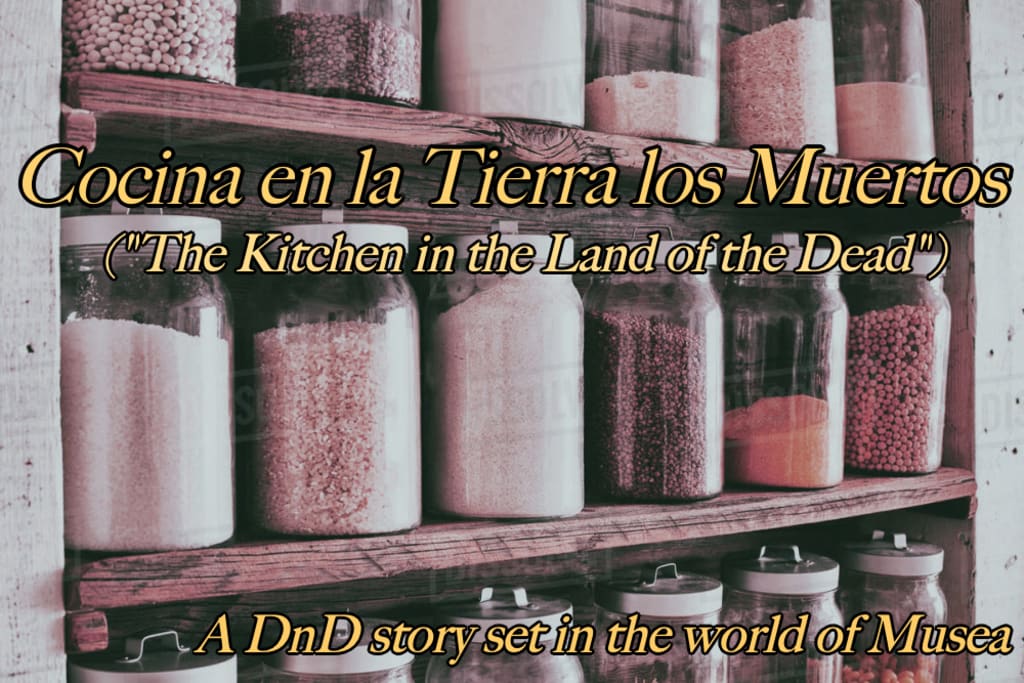Cocina en la Tierra los Muertos (Fable #3)
Part of a series of in-universe fables. "Cocina en la Tierra los Muertos", or "The Kitchen in the Land of the Dead", is an ancient Gnomish fable. It supposedly tells the story of how pan-dulce, the Gnomish practice of baking sweet breads, was invented. It is also considered to be a tale of Tchocolatl (tuh-choc-oh-lat-ill), the Gnomish god of cooking and baking. Tchocolatl is apparently one of many in an Ancient Gnomish Pantheon that was once regularly worshipped in their Kingdom. In the modern day, this Pantheon has been lost to time — to such a point that the character of the baker, Cuallea, is far more well-known than Tchocolatl himself.

Once, a long long time ago, in the ancient Kingdom of Mariposandra, there lived a Gnome baker named Cuallea. The baker owned a restaurant and pastry shop near the heart of Mariposandra, where La Cipactli’s roots were close to the surface. So near was the magic of The World Tree that it seeped into the baker’s dreams while he slept. He would dream of fantastical other worlds: planes of reality full of indescribable colors and wild streaks of light, like comets flying across the surface of the earth. Cuallea’s dreams made him imagine a world bigger than his home at the base of La Cipactli, and that made him happy. So Cuallea was a happy man.
He had a wife and two small children: a daughter who was learning to weave baskets, and a son who was learning to knead bread. Making bread was the baker’s favorite pastime, and the bestseller of his shop. He was overjoyed to see his son taking well to the task.
One dark night, the baker was up late taking inventory. He had lifted a crate of flour onto a high shelf in the back of his shop. He was just getting ready to step down the ladder when suddenly the shelf buckled! The crate plummeted from the broken beam directly onto the baker’s face.
He awoke on the floor, in a place even darker than his shop was at night. He stood up, shaking off dizziness, and felt along the walls until he found a door. He had to reach up to the knob, much higher than him, and pull it down until the door creaked open.
The baker found he was standing in a warm-lit kitchen. A pot over the hearth was engulfed in flame, and big candelabras stuffed with fat black candles dripped onto the stone floor. Two fey were crouched over an enormous book of recipes on the island in the center of the kitchen. One of them turned around quickly, his cloven hooves clicking on the stone, and noticed Cuallea.
“Ah! Tijo, there is a mortal in the cupboard!”
The other fey turned around and yelped, clutching his horns. “Ay-ee! Cobre, it must have been the flour!”
“Flour?” the baker called up at them.
“Yes, our flour basket,” said the fey Cobre. “It was too full, so we poured a little out of the land of the dead. It must have ended up in your flour in the land of the living!”
Cuallea explained to the two fey how the crate of flour had broken Cuallea’s shelf and fallen on top of him.
“Ay-ee!” yelped Tijo again. “Cobre, we’ve killed this poor mortal!”
“Killed? Killed!” exclaimed Cobre. “Why yes, mortal, you’re in the land of the dead. You must have been killed by our flour!”
The two wailed in a panic. Then Tijo clutched the other with a feathered hand. “I feel terrible, Cobre! It’s all our fault. We should make it right.”
The other fey nodded. “Wise words, Tijo! We’ll lead the mortal back to the land of the living. Mictēcacihuātl watches over us.”
The two fey set off across the kitchen, gesturing for the baker to follow. The baker was still trying to understand how the extra flour had gotten into his crate. It didn’t make much sense, but the fey seemed quite sure of themselves. And Cuallea didn’t know where he was. He decided it would be a good idea to follow along for now.
But the baker could scarcely make it a few steps before he was stopped again. His eyes had adjusted to the warm light of the kitchen, and he could see clearly what was in this room. Stacked on every clean surface, on the tables and counters and island, was a veritable feast of different delicacies and dishes! The baker rushed to the nearest counter, which was piled high with many different breads.
“Ay-ee, Cobre!” called one of the fey. “Where is the mortal?”
“He’s looking at the pan de muerto.”
Cuallea reached up high above him to pull the closest bread off the counter. It was the size of his head. He breathed in deeply—it smelled wonderfully sweet! When he looked at the bread, he was shocked to see a conical pattern of packed sugar on top, like the ridges of a conch shell.
Hardly believing his eyes, the baker tried a bite of the bread. It tasted like a cake without icing, sweet but fluffy and light. The baker held it up in triumph.
“This is wonderful!” he told the fey. “I have a son who loves sweet things. Bread and sugar are his favorite foods!” The baker laughed. “Please, you must let me take this home to my son.”
“You can’t take our pan de muerto!” said Cobre, offended.
The other fey wrung his feathered hands together. “This recipe is ours. It belongs to the land of the dead, not the land of the living.”
But the baker stood his ground. “This bread is incredible. It would bring such joy to the world.” He puffed his chest. “Food is meant to be shared! In Tchocolatl’s words, if you cannot share the recipe, then you have no recipe at all!”
The two fey exchanged a glance. They had to admit that the mortal was right: Tchocolatl did say that.
“Okay, you may take one recipe back,” said Cobre.
“But only one,” said Tijo, holding up a finger.
Cuallea clutched the sweet bread to his chest, determined to bring it safely home. But then a terrible, wonderful thought occurred to him: if this kitchen had such good bread, then surely every other recipe was equally as amazing!
The baker’s heart turned. He suddenly knew, with grave certainty, that he was about to be faced with hundreds of tempting recipes. Quickly, he closed his eyes and prayed: Please, Tchocolatl, give me the strength to resist temptation and bring this gift home to my son!
The two fey continued to lead the way out of the kitchen. Aware of how small Cuallea was, they walked slowly, meandering on their slender cloven hooves. Their slow pace made it far too easy for Cuallea to see each and every one of the dishes on the counters. A cone of steam next to a huge brass oven proved to emanate from an enormous stone pot. Inside of it, Cuallea could see a hearty, dark red stew full of rice, beans, and steaming meats. It smelled better and stronger than the best meals his wife had ever made. Next to it was another, even bigger pot, full of a stew with shell-shaped pasta. The smell was so sharp and spicy, Cuallea could not stop himself from running to the counter and reaching for the ladle.
He was so small, the fey Tijo had to hand the ladle to him. Cuallea nearly wept at the taste of the soup: spicy, but smooth, warm and filling. “What is this?” said he.
“Sopa de conchas,” said Tijo, without much affect. “The sopa de scorza is much better. Cobre made it himself! It has been stewing on that counter over there for hours.”
A soup even better than this one? Cuallea could scarcely believe it. He went over straightaway, and, with a knee up from Cobre, sampled from a thick orange soup in a giant slow cooker. It had a taste unlike anything Cuallea had ever tried. There was a bitterness to it, but a pleasant, full bitterness—a complexity that ended with an almost sweet aftertaste. “What is this made of?” he asked in excitement. Scorza was not a Gnomish word he knew; he suspected it referred to something from the land of the dead.
Cobre shrugged, the spines on his shoulders flaring. “If you wish to know, simply take it with you.”
Cuallea winced and looked down at the sweet bread still tucked under one arm. He stared at the sopa de scorza longingly. After a while, he looked away, and nodded at the fey to keep walking.
The fey led him to a door on the far end of the kitchen, across from the cupboard where Cuallea had entered. As he walked through the threshold Cuallea breathed a sigh of relief, believing the temptation was over. But it wasn’t to be—on the other side of the kitchen was the dining hall! An enormous dining table dominated the space, longer even than the one in the Gnomish capitol. Its every surface was covered with dishes beyond imagination.
A great roast pig near-sparkling in foreign spices steamed in the center of the table. Next to it were heaping dishes of rices in every color under the rainbow; long plates full of roasted, steamed, and flash-cooked vegetables; fried tortillas and burros near-bursting with ingredients; all sorts of different beans, with different sauces and spices atop them; unfamiliar things that Cuallea could not describe, such as a roasted animal with its tens of arms folded neatly under its fat, round body; lots of sweets too, cakes and puddings and biscuits—and bread. So much bread! It piled around the edges of the table, spilling over the other dishes, covering every available space that wasn’t already covered. Most of the bread was packed with sugar like Cuallea’s pan de muerta, but all of them were of different shapes, sizes, and smells. Some were lightly bronzed, others nearly black from baking; some were decorated with conical swirls while others had Chīmalmā’s symbol dusted on top. Before he even knew what he was doing, Cuallea was trying a bite of every bread he could reach.
“What is this one?”
“Puerquito,” said Cobre.
“And this?”
“Mariana,” said Tijo.
“Oh, this one has filling!”
“Besos!” said Cobre. “My favorite.”
“The color on this one…!”
“The pan de feria has to be pretty,” said Tijo. “It’s for the Gods!”
Every bread Cuallea pointed at, the fey had a name for it. Calabaza, elote, panquecito, gendarme, novia, pan catarino, pan de pueblo, pan de yema, pan de caja, pan de pulque, pan en forma de tornillo… Cuallea’s head was spinning! He felt as though he could spend the rest of eternity in this room asking the fey about the breads and would never succeed in getting through all of them. He also felt that this feeling was more than just a feeling.
“Can’t you tell me a single thing?” cried Cuallea. “Just the names of the ingredients?”
The fey shook their horned heads. “One recipe, we said,” said Tijo. “Only one.”
It tortured him to even think, but he knew he would have to leave the land of the dead without discovering the secrets of all this wonderful food. But surely any of these amazing breads would be perfect for his son! Shouldn’t he take the time to find the very best one?
He looked up at the mighty dining table full of food. There were so many breads—so much food in general—that Cuallea could not look at all of it at once. He had to turn his head from side to side, taking in the picture in a sweeping panorama instead of as one, whole image. There was no one, whole image. Only disparate parts. In front of him was not recipes, but mysteries: mysteries of cooking, of fey, of his own people’s history. Unexplained wonders whose true histories are only hinted at, fading even as he stood in front of them into vague memories lost to time. He would never find the best bread in this kitchen, he realized. No one would. It was not information that anyone could have.
“Fey, I am ready to go home,” Cuallea told them suddenly.
“Ay-ee!” said Tijo. “He’s sure?”
“Very sure,” said Cobre. “We’d better hurry along.”
They led him out of the dining hall, away from the kitchen, away from the sweet and spicy and savory and magical smells of the food. Eventually they came to an enormous set of double doors at the front of a yawning foyer. The doors were so tall that even when Cuallea craned his neck as far as it could go, he could not see the archway at the top.
Cobre pushed one of the doors open—it was so big that even he struggled. “Goodbye, little mortal!” said Tijo at the same time. “We are sorry for the trouble, but very glad you liked our kitchen.”
“Promise to share the pan de muerto with the other mortals, yes?” said Cobre.
“I promise,” said Cuallea.
Then Cobre pushed the door open the rest of the way, and a great white light rushed out of the opening to meet Cuallea. It seemed to race past him, like wind through a tunnel, yet once it had engulfed him it felt as though he were the one racing forward and the light was standing still. It felt as though he were going faster and faster, rushing through the light as if it were a corridor. Faster and faster he went, until, instinctively, he put his hands up over his face—
“Padre, padre! Ah, Tchocolatl save us!”
Cuallea opened his eyes to see that he was lying flat on his back in the back of his bakery. The broken shelf loomed creaking in the corner of his vision. Above him, the worried face of his son hovered.
“Padre?” said he. “You’re alive!”
Cuallea blinked in wonder at his son. “Mijo… mijo! I have the most wonderful idea for a recipe!”
“Eh?”
Cuallea roared unsteadily to his feet. “Yes, yes…! It’s wonderful. A bread that’s sweet, with a coating of sugar—like a cake without frosting! I haven’t a clue where I got the idea from, but I know somehow it will work. I’ll call it pan de… pan… Ah, what was it…”
“What was what?” asked his son, baffled.
“Nevermind, we’ll call it pan dulce! Pan dulce will do.”
Cuallea’s son just shook his head. “Padre, I told you we should not have lived so close to La Cipactli. The magic of the Tree must have gotten into your thoughts. Now you are talking nonsense!”
The very next day Cuallea baked his first pan dulce, and put it in the center of his shop window. By the following day, he had made ten more, and sold them all by afternoon. By the day after that, gnomes were crowding his door asking for the recipe. He gave it to all of them. Pretty soon, it seemed that every house in Mariposandra had a gnome who was an expert at making pan dulce. Cuallea didn’t mind; he gave the recipe to anyone who asked. He didn’t even think about why—he simply knew in his heart that it was what Tchocolatl would do.
About the Creator
Olivia Fishwick
Olivia Fishwick is a freelance writer in Johnson City, Tennessee. She used to live in Arizona, but the desert was already weird enough without her getting involved. She uses Vocal to share stories and anecdotes from her DnD world, Musea.






Comments
There are no comments for this story
Be the first to respond and start the conversation.